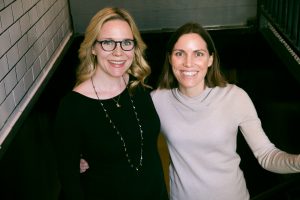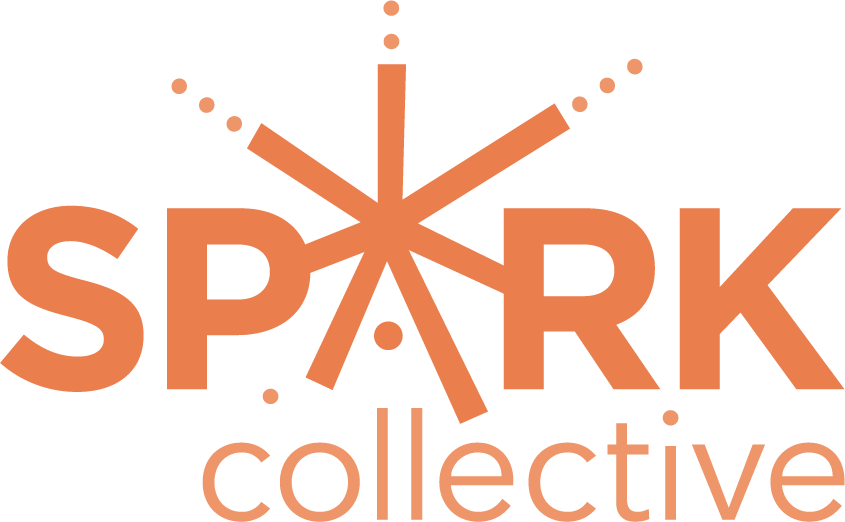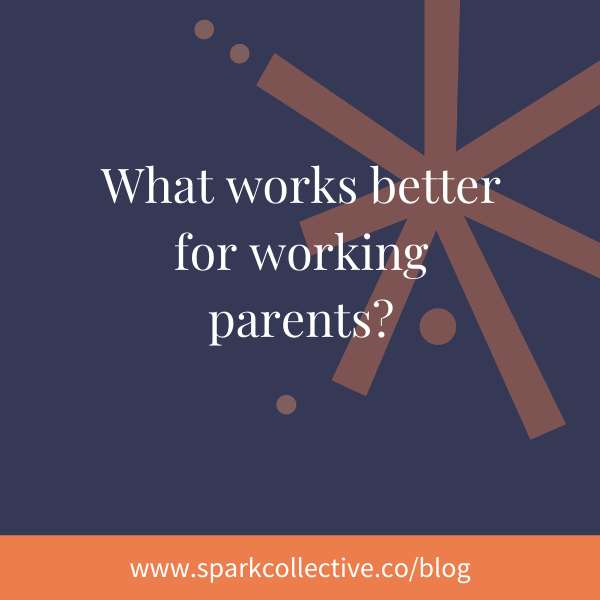For our first Spark Series Salon of 2020, we hosted twenty thought-leaders, talent and inclusion leaders, and heads of employee resource groups across industries like tech, media, and consulting, who came together to discuss the future of working parenthood. We were joined by special guest Emily Oster- a working mom of two, economist, professor, and bestselling author of Expecting Better and Cribsheet.
We explored questions like:
- Whose working parent experience do you admire?
- What will this generation of parents seek from our culture, homes, workplaces, and other systems, and how will that require innovation in how we approach working parenthood?
- How can we create spaces across workplaces of all sorts, and even in our own homes, that are inclusive of working parenthood?
Below are some themes that came up, and we’d love to hear from you as well.

Spark Series Salon in Manhattan, NY. Callan Blount Fleming, founder and CEO of Spark Collective. Emily Oster, author and special guest.
Parenting/working parenting is changing:
It seems this generation of parents has a new set of expectations for how to parent and who is doing it. Many institutions have not yet caught up, and companies in particular will need to innovate to keep attracting and retaining the high-performing and diverse talent that drives all important measures, including productivity, profitability, engagement, and employee health.
Systems are designed and, therefore, can be redesigned.
Many of us have inherited deeply held beliefs that 1) the “ideal worker” is always available and without familial responsibilities and 2) that work has to be structured the way it is. We then accept that humans (even the tiniest, most demanding of them!) need to fix themselves to fit into the demands of the workplace.
One solution: we can and should challenge ourselves to own that the way we work isn’t working and instead design for the outliers. Dig into this idea a bit more with this short clip from a speech I gave about creating environments that work for parents.
It’s all about values-based and people-centered leadership:
Understanding our own values will help us to be content with our parenting decisions. Knowing our values will help us lead successfully, as will learning the values, priorities, and lived experiences of others.
As leaders, we’re more successful when we focus on “humans and people” instead of “work and workers,” or as I put it often- when we engage in people-centered leadership instead of process-centered leadership.
And we talked about publicly championing the really great work of working parents, including ourselves!
We had some leaders at the table who work for values-driven organizations of which they are quite proud, and they also know that those values are a huge asset for continued innovation.

Spark Series Salon. Special guest Emily Oster.
Make good policies and make sure they play out as you hoped:
We recognized that institutions are trying- in fact, many in the room have some of the most progressive family-related policies in the country. We recognized, though, that often times, the way that those policies are implemented disadvantages women.
When designing policies, we should play out multiple implementation scenarios to ensure equity. We also need policies and practices to work in concert, like ensuring promotion cycles aren’t unfairly elongated because an employee took leave.
“You can have the best policies, and you still need to invest in managers.”
We heard about CEOs who were emailing on their blackberries during labor. Whether it was their intent or not, we heard about established leaders effectively standing in the way of innovation, saying, “I did it this way and so should you.”
(In fact, there is a psychological phenomenon that once we get through something difficult, we forget how hard it was and lose empathy for others going through the same thing.)
Looking forward, we talked about how millennials will be 75% of the workforce by 2025 and by then, ages 29 to 45. They are currently parenting 8 of 10 babies born in the US and demanding innovation in the way organizations work (especially in a tight talent market). And they will be moving into leadership roles in the coming years.
It’s possible we’ll see a groundswell of new leadership with different mindsets that will then drive innovation and equity, especially if we target training and development support now.
And so our question became, knowing how centrally important it is, “What do we do about leadership right now?” Some potential solutions included:
- Advancing innovative policies in terms that leaders may find compelling (ROI of investing in new ways of working, reputation, retention, etc.)
- Focusing on middle management leadership development, as we know these are the leaders most likely to influence successful working parent experiences
- Individuals continuing to push for innovations and doing so together (like in employee resource groups, or ERGs)
Each of us made a commitment to action, and all of this came from just two hours of talking (and some delicious short ribs and chicken sandwiches).

Spark Series Salon. Callan Blount Fleming, founder and CEO of Spark Collective.
Here’s the thing- I know this is a lot. And it’s complex. And yet, I shared a story about how only five years ago, I was a short-sighted, process-centered, work-obsessed leader who made a mistake with a new parent colleague that contributed to his resignation. And in the past few years, I’ve made gains as a leader through taking responsibility for making work better; seeking out coaching and training; and taking some professional risk to propose a new way of working – one that, by the way, all the data says is the right way to work anyway.
It requires work, but it’s not impossible. And it doesn’t have to take a long time.
So… want to get to work?



Recent Comments